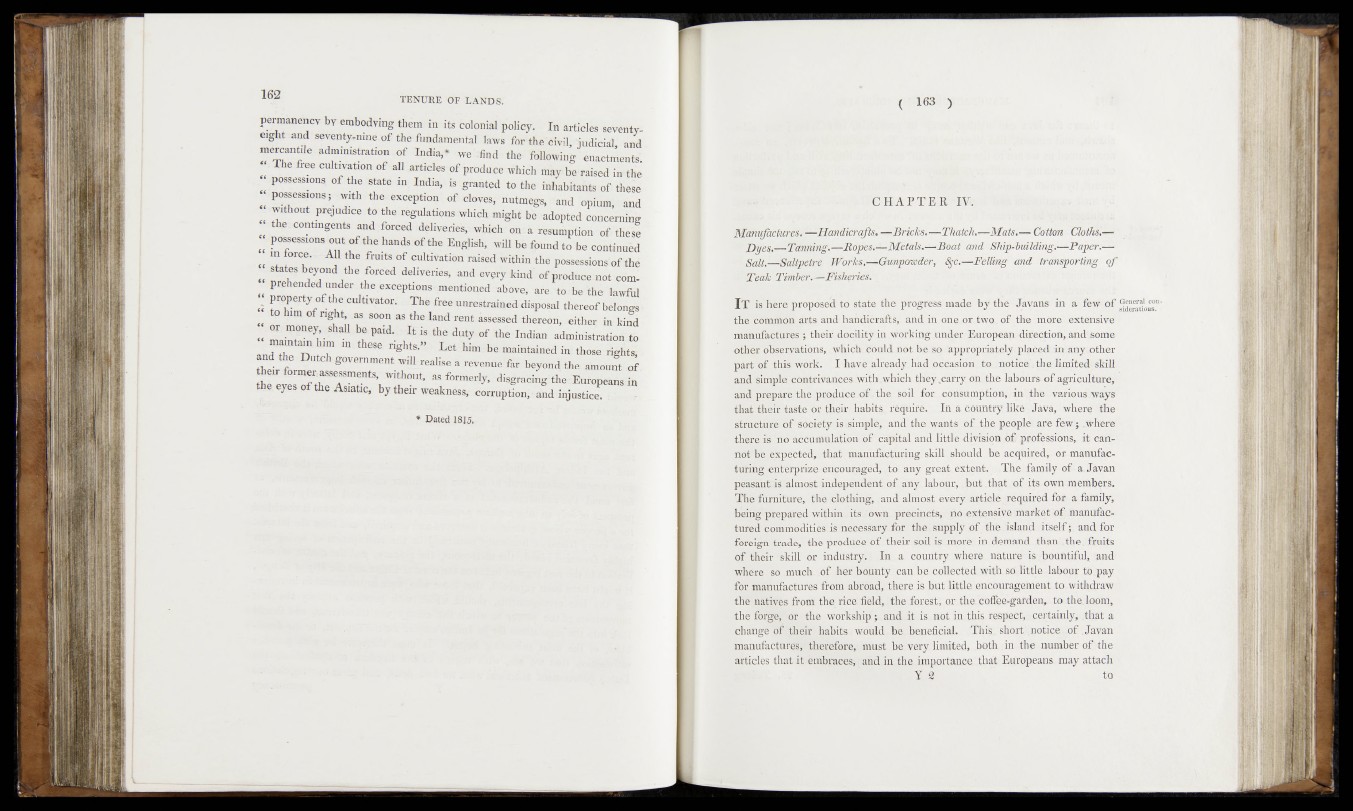
permanencv by embodying them in its colonial policy. In articles seventy-
eight :and seventy-nine , of .the fundamental laws for the civil,-iudicial and
mercantile administration of India,* -we-find, the- following 'enactments.
The free cultivation of ->all articles of produce which maybe-raised iwtfre
‘ possessions of R e state in India, is granted to the inhabitants of these
possessions; < with j the.: exception of cloves, nutmegs, and opium, and
S S P f J p ju d ic e to the regulations .which might be adopted concerning
the .contingents and-forced deliveries,, which on.a resumption of th e^
out f m hands of the English, will be found to be continued
2 ■ f°r<f ' ’ A !1 the fmits of cultivation raised within the possession® ofthe
„ ^ b.ej? n d ,the forced deliveries, and every kind'.of produceuiot com!
I P^ekeuded under the exceptions< mentioned above,- are to:be the lawful
1 Pr<>Pe% ^ ^ » cu ltiv a to r. . Thefiee unrestrained disposal thereof belongs--
g cf ngM .as soon as the land rent assessed_thereon, . either in kind
« maint°ne V 1 W F I 1 S t * * * *he Indian administratioh to
a n Z Z D H 1D' ^ nghtS” 1 in:those rights;
their ltCh g°Vernment ^ ^ ’^areveniiVfar b e ^ t h e amount of.
r ; r ef m 81 § 1 1 1 S P i | disgracingttheEuropeans in
the. eyes of the Asiatic, by their weakness,- corruption,- and injustice ! r
* Dated 1815.
: C H A P T E R IV. :
Manufactures.—Handicrafts.—JBricks.—Thatch,—Meets.—’Cotton Cloths'.— .
Z)fe$i—Tatining.—Ropes.—Petals.—Boat and Ship-building.—Paper.—
' Salt.—^Saltpetre Works.—Gunpowder, —Felling and transporting o f
Teak Timber.—Fisheries.
I t is here proposed to state the progress made by the- Javans in a few of
the common arts and handicrafts,, and in one, or two. oft the-.more extensivd'
manufactures; their docility in ,working__under European direction,.andlsome
other observations, which could not be iso.. appropriately placed in any.other
part^of 'this work. I have already-hadioccasipn to noticeVthe limited^skill
and simple, contrivances with-which they .carry onith.e labours, of agriculture,
and prepatethe produce, of-the soil for consumption,^ in the various Avays
that their taste or their, habits,, require. In a country, like ■ Java,-where 'the
structure of society, is isimple, and the wants of .the .peoples ai*e.feW; .where
there is no accumulation-of capital and little- division of} professions, it-cannot
bej^bdeted^that manufacturing skill should be acquired, or manufacturing
enterprize.eircoOraged, to any great extent. aSShe^family■ of- a. Javan
peasantislalmost independent,of any labour, .but .thati'qf;its own members.
The furniture, the clothing,, and almost every article required for-a family,
being*prepared.within its. own precincts, jio extensive marketof .manufactured“
commodities is necessary for theisupply of the i'island.utsel-fand for
foreign trade, the produceiof. their soil is more in.demand than .the, fruits
of their skill or industry. 1 In a countryrwhbtei-lnaturw is ^bountiful, and
where, so much .of her bounty can . be „collected -.with, sbjitfcle-labour to_pay
iS| manufactures from abroad,, there is but little encouragement to withdraw
the natives from the rice field, - the forest, or the.coffee-garden,..to the.loom,
the forge, or the workst$pi;-, and it is not in this t&jgeSfi^certainly, .that a
changehT their habitsuwohld.he. beneficial., ..Thi§^ short\notice!«of .Javan
manufactures;-' therefore, must.be.very limited, both .in the number pf^tho’,
articles that it embraces,. and in the.^ijnportance.. that Europeans, may attach
y | to